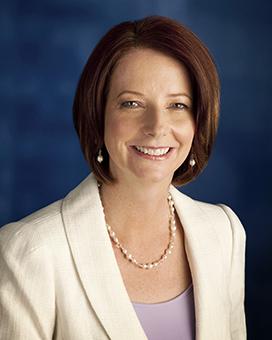On Monday 3 December 2007, Kevin Michael Rudd became Australia’s 26th head of government. He was only the second whose oath of office swore allegiance to the nation, not to the head of state. In omitting mention of Queen Elizabeth II, he followed the lead of Labor Prime Minister Paul Keating nearly 20 years before. And like Paul Keating, it was Kevin Rudd and not the Labor Caucus who chose the new ministers.
But it was still the Queen’s representative, Governor-General Sir Michael Jeffrey, who created the new government. Swearing in the 20 new Cabinet members, 10 other ministers and 12 parliamentary secretaries, the Governor-General explained the power delegated to him by the Crown to recognise those with the majority of seats in the House of Representatives as the new government.

Prime Minister Kevin Rudd being sworn-in by Governor-General Sir Michael Jeffery, Government House, Canberra, 3 December 2007. AUSPIC, Howard Moffatt
The Ministry
The Cabinet ministers took their oath of office in turn, beginning with Rudd and then his Ministry which comprised:
- Julia Gillard - Deputy Prime Minister, with 3 portfolios: Minister for Education, Minister for Employment and Workplace Relations, and Minister for Social Inclusion
- Wayne Swan – Treasurer
- Penny Wong – Minister for Climate Change and Water
- Chris Evans – Minister for Immigration and Citizenship
- John Faulkner – Special Minister of State and Cabinet Secretary
- Simon Crean – Minister for Trade
- Stephen Smith – Minister for Foreign Affairs
- Joel Fitzgibbon – Minister for Defence
- Nicola Roxon – Minister for Health and Ageing
- Jenny Macklin – Minister for Families, Housing, Community Services and Indigenous Affairs
- Lindsay Tanner – Minister for Finance and Deregulation
- Anthony Albanese – Minister for Infrastructure, Transport, Regional Development and Local Government
- Stephen Conroy – Minister for Broadband, Communications and the Digital Economy
- Kim Carr – Minister for Innovation, Industry, Science and Research
- Peter Garrett – Minister for the Environment, Heritage and the Arts
- Robert McClelland – Attorney-General
- Joseph Ludwig – Minister for Human Services
- Tony Burke – Minister for Agriculture, Fisheries and Forestry
- Martin Ferguson – Minister for Resources and Energy and Minister for Tourism.
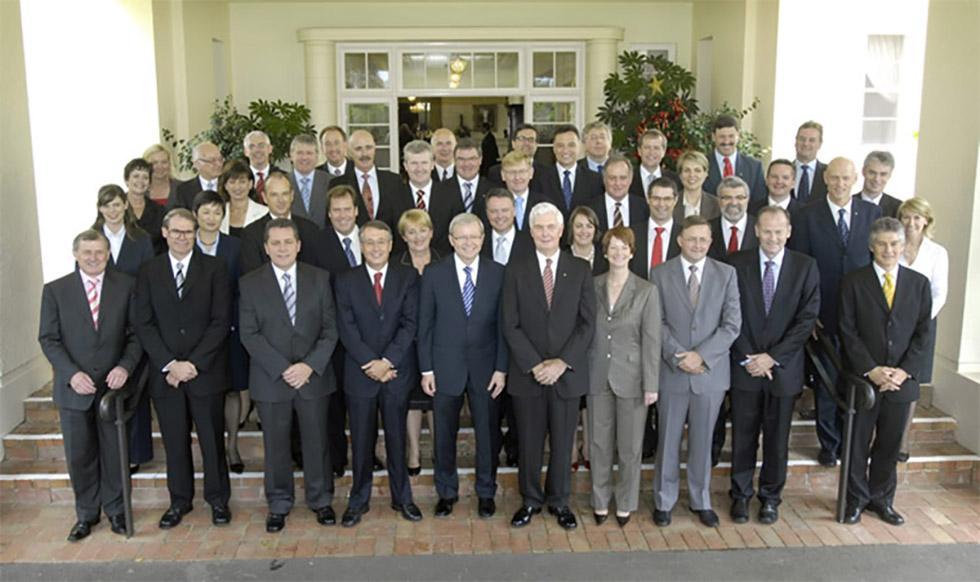
Governor-General Sir Michael Jeffery and ministers and parliamentary secretaries at Government House, Canberra, 3 December 2007. AUSPIC, Howard Moffatt
As well as these Cabinet ministers, Rudd selected an outer Ministry of 10:
- Bob Debus – Minister for Home Affairs
- Chris Bowen – Assistant Treasurer and Minister for Competition Policy and Consumer Affairs
- Alan Griffin – Minister for Veterans’ Affairs
- Tanya Plibersek – Minister for Housing and Minister for the Status of Women
- Brendan O’Connor – Minister for Employment Participation
- Warren Snowdon – Minister for Defence Science and Personnel
- Craig Emerson – Minister for Small Business, Independent Contractors and the Service Economy and Minister Assisting the Finance Minister on Deregulation
- Nick Sherry – Minister for Superannuation and Corporate Law
- Justine Elliott – Minister for Ageing
- Kate Ellis – Minister for Youth and Minister for Sport.
In addition, the Rudd executive included 12 parliamentary secretaries:
- Maxine McKew – Parliamentary Secretary to the Prime Minister with Special Responsibility for Early Childhood Education and Childcare
- Greg Combet – Parliamentary Secretary for Defence Procurement
- Mike Kelly – Parliamentary Secretary for Defence Support
- Gary Gray – Parliamentary Secretary for Regional Development and Northern Australia
- Bill Shorten – Parliamentary Secretary for Disabilities and Children’s Services
- Bob McMullan – Parliamentary Secretary for International Development Assistance
- Duncan Kerr – Parliamentary Secretary for Pacific Island Affairs
- Anthony Byrne – Parliamentary Secretary to the Prime Minister
- Ursula Stephens – Parliamentary Secretary for Social Inclusion and the Voluntary Sector
- John Murphy – Parliamentary Secretary for Trade
- Jan McLucas – Parliamentary Secretary for Health and Ageing
- Laurie Ferguson – Parliamentary Secretary for Multicultural Affairs and Settlement Services.
Climate change
When it took office on 3 December 2007, the Rudd government's first official act was the same day, signing the Kyoto Protocol, an agreement by United Nations member countries to limit greenhouse gas emissions. Australia and the United States had been the only member nations which had not ratified this international instrument for climate control, passed 10 years before. The following week, the Prime Minister, the Minister for Climate Change Penny Wong, Environment Minister Peter Garrett and Treasurer Wayne Swan attended the United Nations Climate Change Conference in Bali.
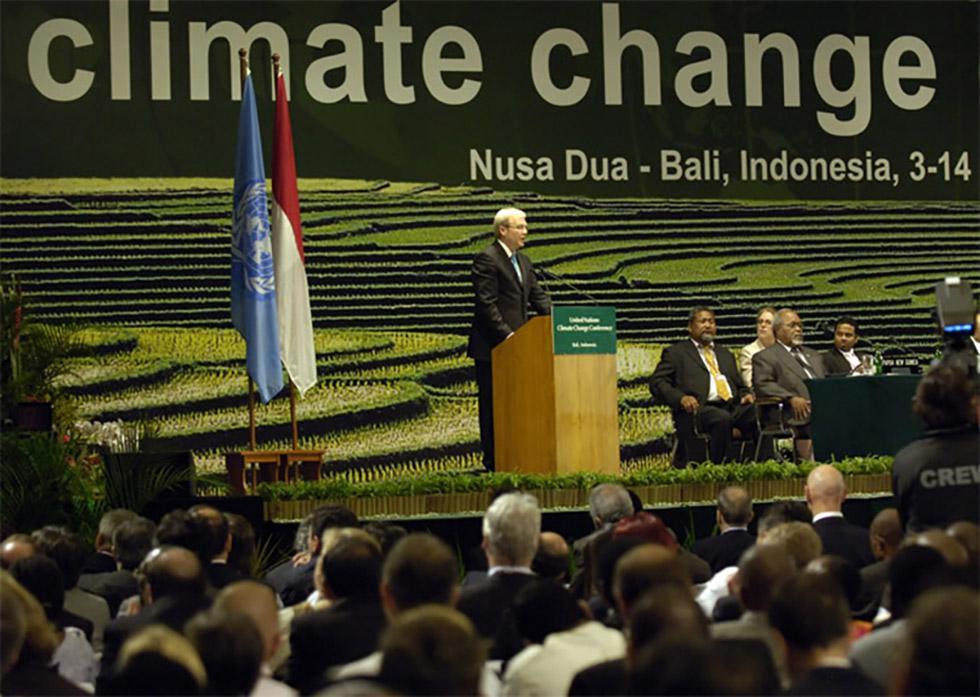
Kevin Rudd at the United Nations Framework Convention on Climate Change in Bali, Indonesia, December 2007. AUSPIC, Michael Jones
The importance of climate change dominated Rudd’s term in office. After the tabling of The Garnaut Climate Change Review in 2008, an independent study commissioned from adviser Ross Garnaut, climate change replaced terrorism as a dominant global issue for the Rudd government.
But within the first year there was another more urgent issue: the global financial crisis - dubbed 'the GFC'. During this period, the government negotiated Coalition support with compensation terms for electricity generators, totalling $7.3 billion over 10 years. When the Bill was introduced into the Senate in 2009, both the targets and the industry compensation terms of the scheme were opposed by the Greens and defeated by their Senate votes 3 times. With the Opposition rejecting any emissions trading scheme, the government failed to make progress on this policy priority.
The Apology
The opening of Australia's 42nd Parliament on 13 February 2008 was the first to be preceded by a welcome to country, when Ngambri elder Matilda House performed this ceremony in Parliament House. The same day there was another first, when the Prime Minister led an apology in the Australian Parliament to Indigenous people, for the 'profound grief, suffering and loss' caused by past policies, particularly the policy of removing children from their families.
Together with Opposition leader Brendan Nelson, the Prime Minister received a gift from Indigenous leaders acknowledging the apology. The historic event was televised not only to large crowds gathered outside Parliament House in Canberra but also to those assembled at special outdoor screens in cities and remote communities in every state and territory. Inside the House of Representatives and at outside venues around Australia, the Prime Minister’s speech brought tears, cheers and standing ovations.
The government’s pledge to reduce the high mortality rate of Indigenous people was a key policy with wide support and ongoing challenges, especially in arresting mortality rates of adults in Indigenous communities.
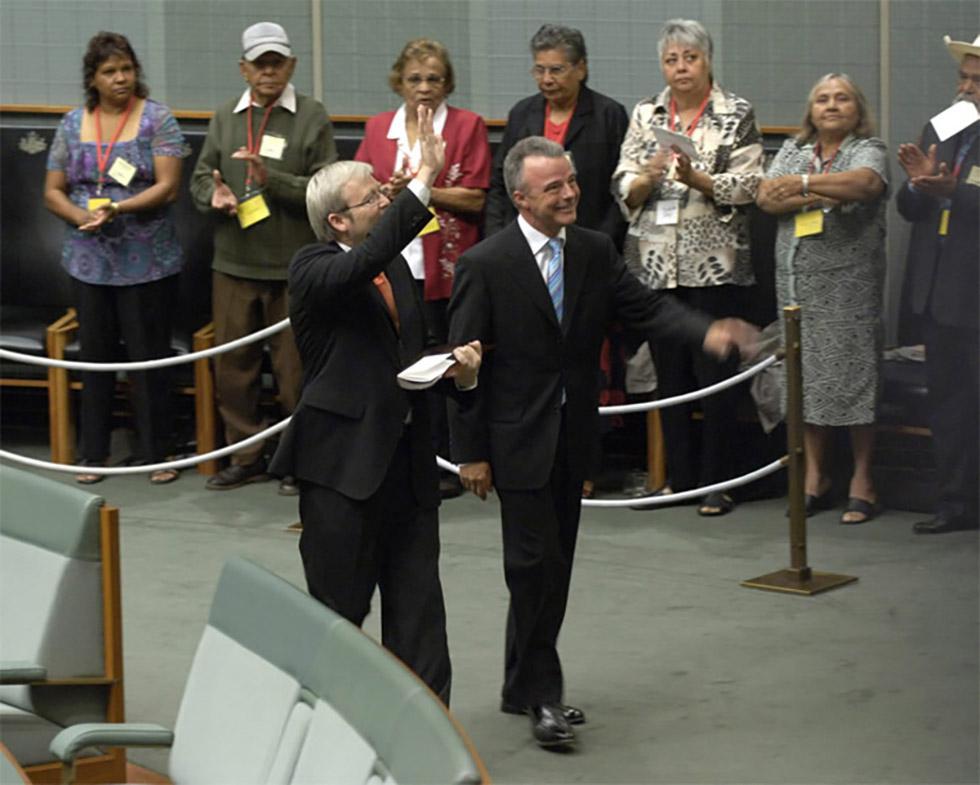
Kevin Rudd and Opposition leader Brendan Nelson in the House of Representatives for the Apology to Australia's Indigenous Peoples, 13 February 2008. AUSPIC, David Foote
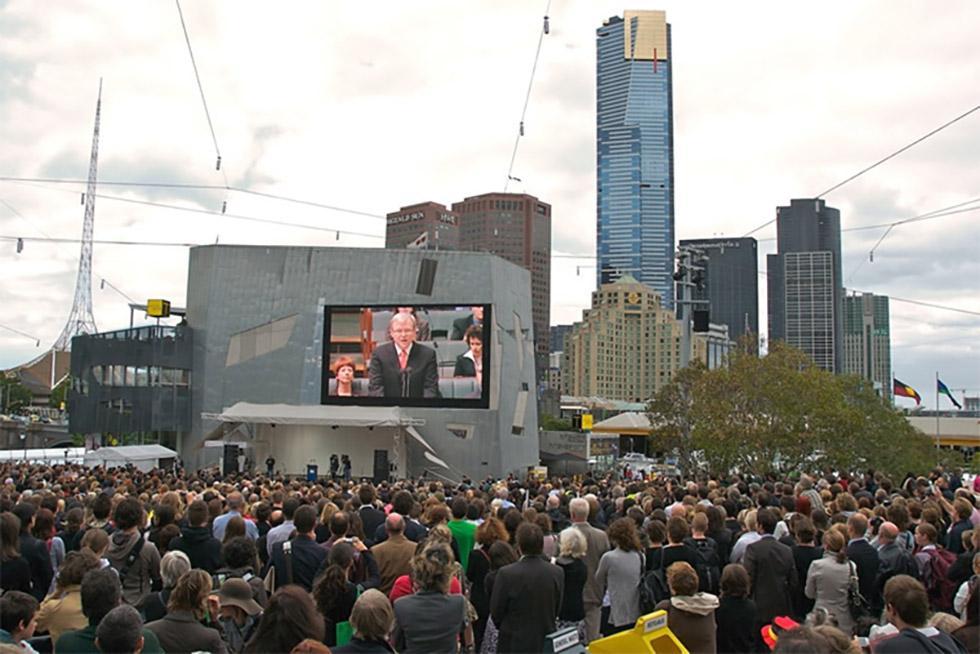
People watch the Prime Minister's speech on the big screen at Federation Square, Melbourne, 13 February 2008. Virginia Murdoch
International relations
As well as attending the Bali climate change conference in December 2007, in his first 4 months in office, Rudd visited East Timor, Papua New Guinea and the Solomon Islands.
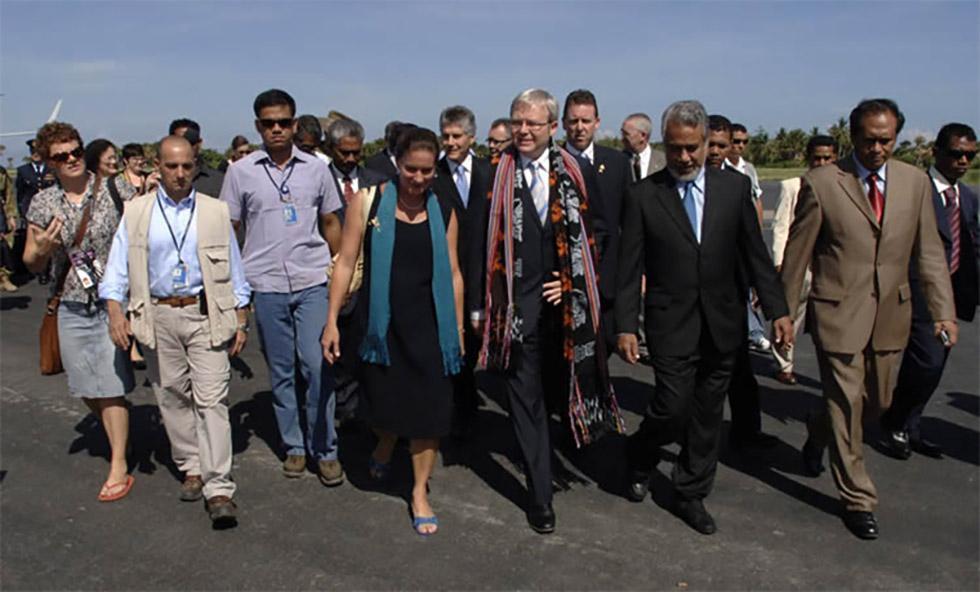
Prime Minister Kevin Rudd with the Prime Minister of East Timor Xanana Gusmao and his wife Kirsty Sword Gusmao, Dili. AUSPIC, Michael Jones
In March and April 2008, he and his wife Thérèse Rein set out on a 3-week round-the-world tour to 5 countries, meeting US President George Bush in Washington and United Nations Secretary-General Ban Ki-Moon in New York. They went on to Brussels where the Prime Minister attended an economic forum. Engagements in London included an audience with the Queen at Windsor Castle, meetings with Prime Minister Gordon Brown and Foreign Secretary David Miliband, and a speech at the London School of Economics.
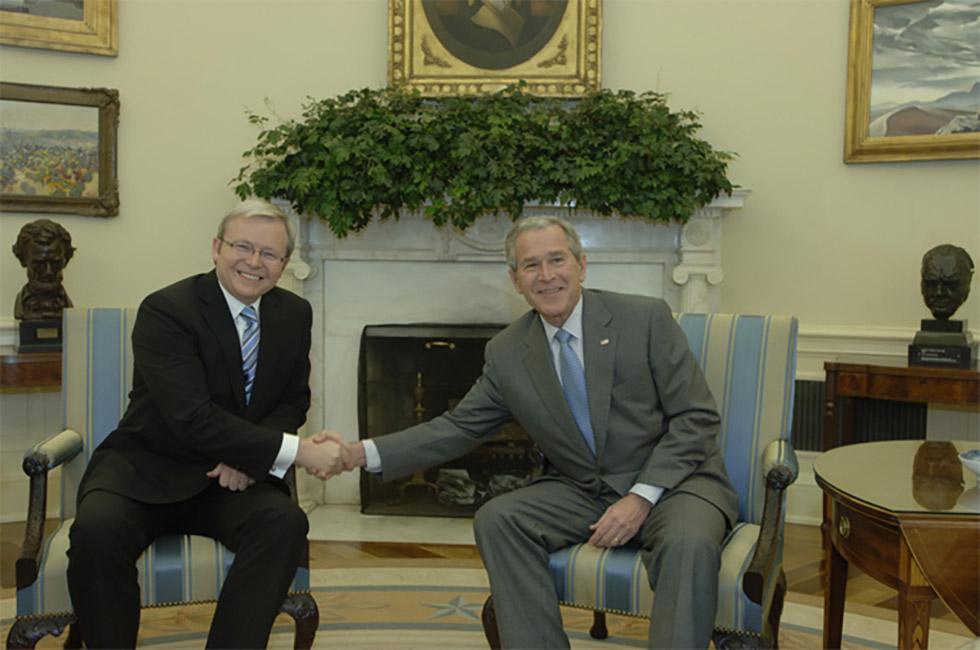
Prime Minister Kevin Rudd with United States President George W. Bush in Washington DC, April 2008. AUSPIC, David Foote
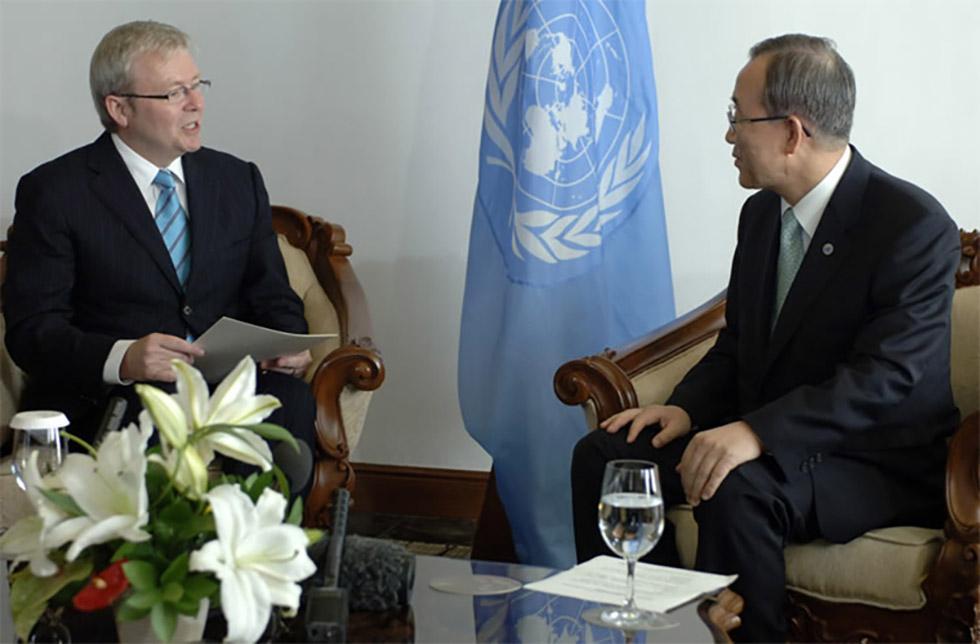
Prime Minister Kevin Rudd hands over the instrument of ratification of the Kyoto Protocol to the United Nations Secretary-General, Ban Ki-Moon. AUSPIC, Michael Jones
Their trip concluded with a visit to China that included meetings with Chinese Prime Minister Wen Jiabao and President Hu Jintao. The Australian Prime Minister attracted international media coverage as the only Western leader to express concern in China about the country’s role in Tibet and human rights abuses there. Most widely reported was his 'zhengyou' speech to students at Beijing University, where he linked 2 key figures in recent Chinese political history, 20th-century writer and dissident Lu Xun and leading 19th-century thinker Kang Youwei, with 7th-century intellectual Wei Zheng as exemplars of the need for reasoned criticism. While the press in some regional countries wrote of this as presumptuous for a Western leader, China's official newsagency Xinhua reported that 'eyes lit up' at the reference to 'friendship based on speaking the truth'.
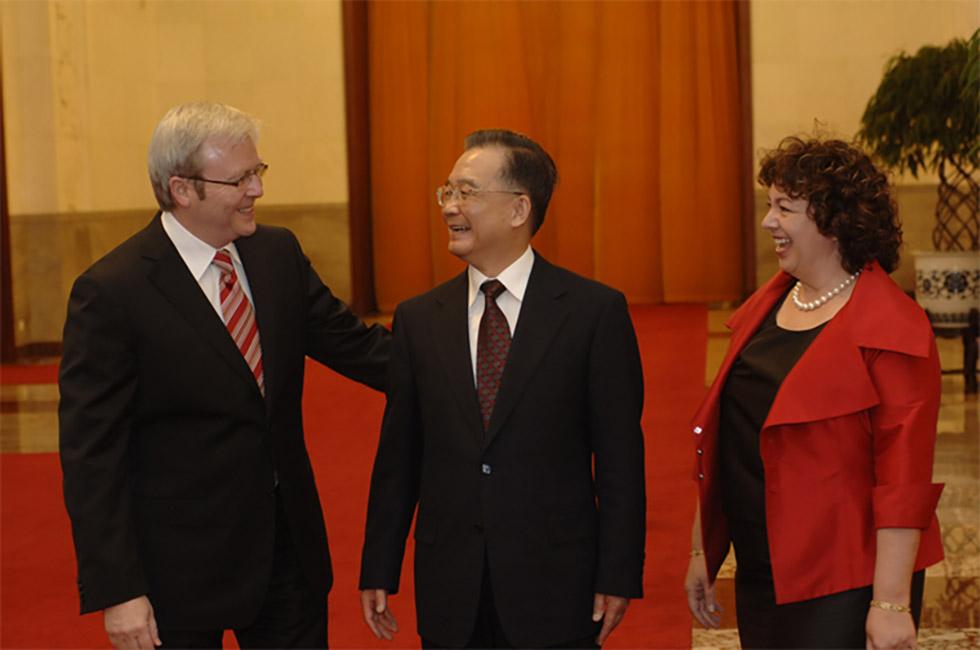
Kevin Rudd and Thérèse Rein with Chinese Premier Wen Jiabao, 2008. AUSPIC, David Foote
In June 2008, Rudd and Thérèse Rein visited Indonesia, for meetings with President Susilo Bambang Yudoyono, and to open a primary school in Banda Aceh, one of the projects undertaken with the Australian aid provided by the Coalition government of John Howard following the tsunami in 2004. The same month, the couple made an official trip to Japan, visiting the shrine at Hiroshima. The Prime Minister returned to Tokyo the following month for the G8 summit, and in August returned to Beijing for the opening ceremony of the 2008 Olympic Games. At the end of September, he was again in New York where he addressed the UN General Assembly and lobbied for a Security Council seat for Australia. Although he was expected to speak on climate change, the Prime Minister used the occasion to urge united action on the global financial crisis.
This intensive program of overseas engagements was repeated the following year. The Prime Minister's 2009 itinerary included visits to the United States in March to meet new US President Barack Obama and to Italy for the G8 climate change talks, and an audience at the Vatican with Pope Benedict, during the final process leading to the canonisation of the first Australian saint, Mary Mackillop, on 14 October 2010.
In September 2010, Rudd was in the United States for the G20 Summit, and he also delivered a video address to the UN General Assembly on the vital importance of urgent worldwide action on climate change. As in his UN speech the previous year, he also made a case for a Security Council seat for Australia.
In October 2010, Rudd was in Thailand for the ASEAN meeting and the following month again in Washington for discussions on climate change and on Australia's ongoing contribution to the NATO presence in Afghanistan with US President Barack Obama and Secretary of State Hillary Clinton. From the United States, he travelled to Copenhagen for the UN Climate Change Conference where he gave a rousing call to world leaders to 'strike a grand bargain'. They did not; the accord reached fell far short of target goals and strategies.
Of Rudd’s 31 months in office, roughly 7 months were spent travelling overseas, prompting comment about his heavy emphasis on international relations and his frequent absences from Australia. The total absence for the period was actually less than that of some other prime ministers, including the longest-serving, Robert Menzies.
The global financial crisis
When Rudd addressed the United Nations General Assembly in New York in September 2008, he departed from the intended subject of climate change to speak instead on the deepening global financial crisis. With this speech, he launched the case for a new world alliance, the G20, now regarded as a key development in global governance. The G20 became as he urged, a 'pivotal body in world financial affairs'.
The G20 was formed in response to the worldwide economic reversal that developed from late 2007. The GFC has been assessed as 'the greatest regulatory failure in modern history'. It was a major challenge for the governments of all the developed nations. In Australia, the Rudd government's response included planning an economic stimulus package. Launched in October 2008, it was the first of any affected nation. This action, and with follow-up strategies, meant expenditure of some $75 billion on a nation-building recovery plan that included a public works construction program and federal guarantee of bank deposits. The total expenditure on the stimulus package represented the highest proportion of GDP of any of the advanced economies. An IMF survey in 2009 showed that Australia was the only one of 33 major national economies to avoid a crippling recession.
Explaining the principles, adapted from economist John Maynard Keynes, underlying his Government's activist strategy, Kevin Rudd wrote:
The social democratic state offers the best guarantee of preserving the productive capacity of properly regulated productive markets, while ensuring government is the regulator, that government is the funder or provider of public goods and that government offsets the inevitable inequalities of the market with a commitment to fairness for all.
While the response of the Rudd government earned acclaim, the speed of design and implementation of the stimulus initiatives meant that not all were equally successful. Some projects within the school building program were later shown to have been wasteful, while the major project geared both to stimulus and climate, the ‘pink batt’ roof insulation program, drew strong criticism for ineffective design, poor results and dangerous practices by unskilled installers.
Fair Work Legislation
Employment practices were a key policy area of the Rudd government, and initiatives were introduced in his government’s first year. Replacing parts of the Howard government’s industrial relations system was given priority. The passage of the Fair Work legislation through Parliament removed the WorkChoices program, which had been an equally prominent reform of John Howard’s government. From 1 January 2010, the new standards applied to all federal employees at all income levels.
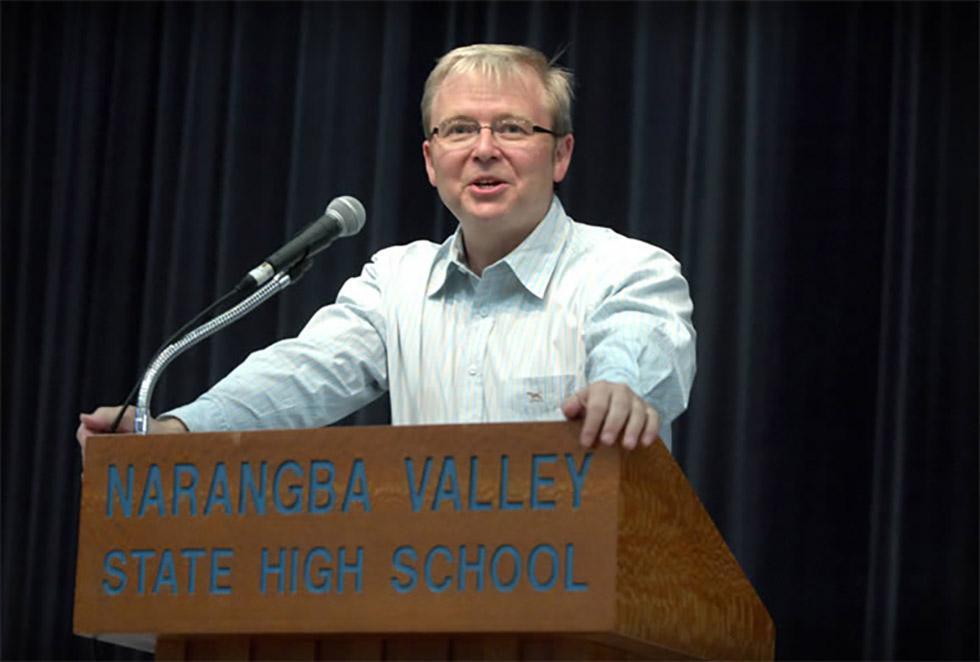
The Prime Minister at the government's second Community Cabinet Meeting, Narangba Valley State High School in south-east Queensland, 2 March 2008. AUSPIC, Mark Graham
Public participation
The Rudd government introduced 2 initiatives to enhance public participation in government: a 'travelling Cabinet' with meetings held around Australia and the 2020 Australia Summit, where 1000 participants gathered at Parliament House on 19–20 April 2008 to generate ideas and strategies in key areas such as climate change, water, international security, health and Indigenous Australia.
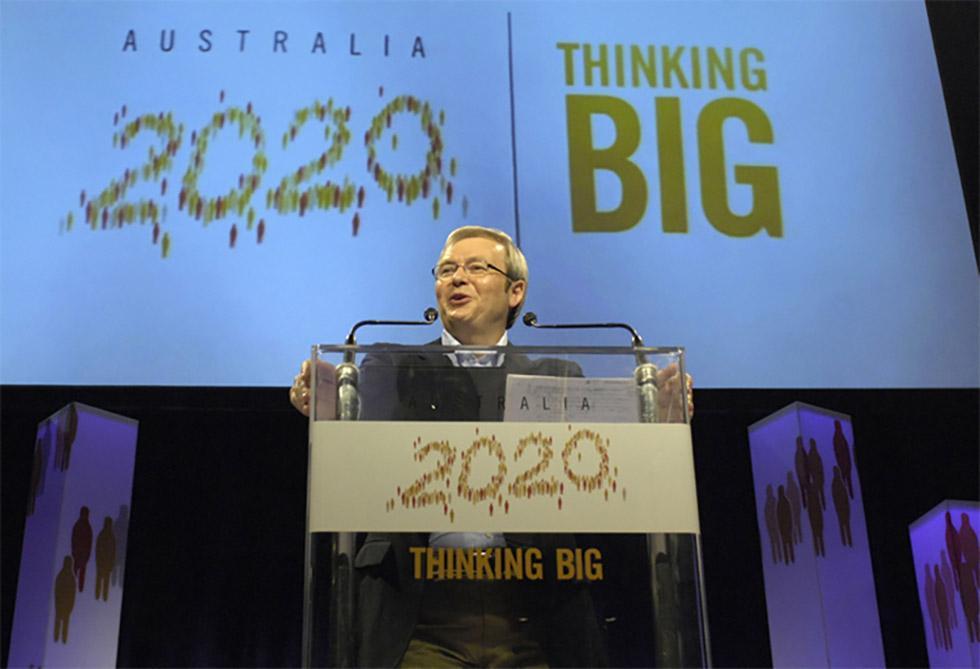
Prime Minister Kevin Rudd at the official opening of the Australia 2020 Summit, Canberra, 19 April 2008. AUSPIC, Howard Moffatt
Although few of the ideas generated at the Summit were implemented by the Rudd government, an important exception was the review of Australia’s taxation system. In 2009, Treasurer Wayne Swan established a review team headed by Treasury head Ken Henry. The Henry report, released on 2 May 2010, included a new ‘super-profits’ mining tax to fund increased superannuation contributions, one of the strategies towards a ‘simpler and fairer’ tax system.
The opposition of the mining industry to the super profits tax, added to the credibility gap that opened with the abandonment of the Carbon Pollution Reduction Scheme announced the previous month, was reflected in the media and opinion polling.
On 24 June 2010, Rudd became one of the few leaders to be removed by their own party in their first term as prime minister. He was not the first. Robert Menzies’ first term had also ended in the bitter disappointment of withdrawal of his party’s support in August 1941. Nor was Rudd’s 2½ year term in office brief in comparison with those of his predecessors. Menzies’ first term was even less – nearly 3 months short of Rudd’s. In fact, only 10 of Australia’s prime ministers remained in office more than 3 years.
Second term
After enduring a period of incessant leadership speculation in Australia's first hung parliament in over 70 years, Prime Minister Julia Gillard called a ballot for the leadership of the Australian Labor Party on Wednesday 26 June 2013. Kevin Rudd announced his intention to stand for the leadership and defeated Gillard, 57 votes to 45.
The newly-reinstalled Rudd immediately set about making changes to the way the ALP elected its leaders, with the intention of providing more stability to the party. He also committed Labor to an emissions trading scheme and unveiled the Australia and Papua New Guinea Regional Settlement Arrangement for the processing of asylum seekers. On August 4, Rudd announced an election date of 7 September 2013.
The election campaign saw three leaders' debates which featured exchanges on economic management, the timing and nature of a budget surplus, asylum seeker policy, and the Coalition's paid parental leave scheme. Sexism also arose as an issue.
The Australian Labor Party under Rudd was decisively defeated at the election, with the Coalition under Tony Abbott forming government on 18 September 2013. Rudd subsequently resigned from Parliament on 22 November 2013, but has since been active in academia and international policy institutes.
Sources
- Stuart, Nicholas, Kevin Rudd: An Unauthorised Political Biography, Melbourne, Scribe, 2007.
- Jackman, Christine, Inside Kevin 07: The People, the Plan, the Prize, Melbourne, Melbourne University Press, 2008.
- Rudd, Kevin, 'The Global Financial Crisis', The Monthly, February 2009, pp. 20–29.
- Stuart, Nicholas, Rudd’s Way: November 2007 – June 2010, Melbourne, Scribe, 2010.
- Marr, David, 'Power Trip: The Political Journey of Kevin Rudd', Quarterly Essay 38, June 2010.
- Taylor, Lenore and David Uren, Shitstorm: Inside Labor's Darkest Days, Melbourne University Press, 2010.



